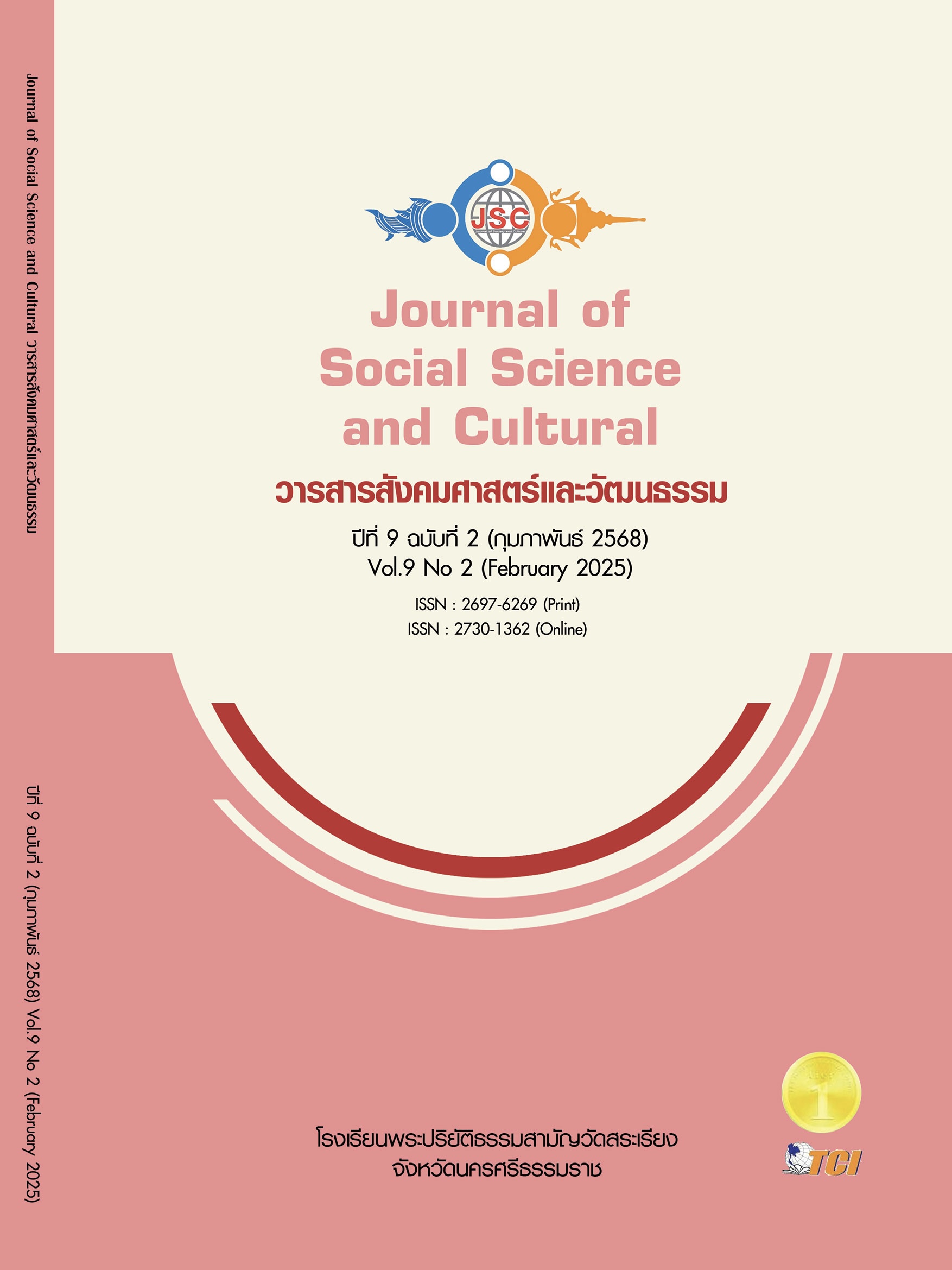FACTORS AFFECTING THE USE OF ARTIFICIAL INTELLIGENCE FOR LEARNING OF STUDENTS IN PRIVATE VOCATIONAL COLLEGES
Main Article Content
Abstract
Artificial intelligence has become significantly influential in all aspects of life, including the field of education, where promoting education has traditionally been the sole responsibility of teachers. However, the rapid growth of artificial intelligence necessitates an adaptation in the future of learning management. This research aims to 1) Study the state of artificial intelligence use for learning. 2) Compare the use of artificial intelligence for learning, classified by personal factors,and 3) Study the factors affecting the use of artificial intelligence for learning among students in private vocational colleges. Data were collected from 400 students, with a purposive sampling method. A questionnaire was used as a research instrument. Data were analyzed using t-tests, one-way ANOVA, and MRA with pairwise differences tested using the LSD method. The study found that 1) The overall condition of using artificial intelligence for learning is at a high level, with the most use being for general facilitation, 2) The use of artificial intelligence for learning varies according to the year of study, field of study, and region of the educational institution, and 3) The factors of technology compatibility, data privacy, and social influence all significantly affect the use of artificial intelligence for learning by students in private vocational colleges in the same direction at a statistical significance level of .01. All factors together can explain 22.70% of the use of artificial intelligence for learning by students. The factors, ranked by influence, are data privacy (Beta = .300), social influence (Beta = .156), and technology compatibility (Beta = 0.141)
Article Details
References
คณะกรรมาธิการการศึกษาวุฒิสภา. (2564). รายงานการพิจารณาศึกษา เรื่อง แนวทางการส่งเสริม สนับสนุนและยกระดับคุณภาพมาตรฐานการจัดการศึกษาอาชีวศึกษาเอกชน ของคณะกรรมาธิการการศึกษา วุฒิสภา. กรุงเทพมหานคร: สำนักกรรมาธิการ 3 สำนักงานเลขาธิการวุฒิสภา.
นิรุตต์ บุตรแสนลี. (2565). การเปลี่ยนผ่านสู่ความเป็นดิจิทัลของสำานักงานคณะกรรมการการอาชีวศึกษา: การผลิตกำลังคนสมรรถนะสูงแหงศตวรรษที่ 21. วารสารวิจัยและนวัตกรรม สถาบันการอาชีวศึกษากรุงเทพมหานคร, 5(1), B-L.
สถาบันวิจัยเพื่อการพัฒนาประเทศไทย (TDRI). (2560). การปฏิรูปอาชีวศึกษาของประเทศไทย. เรียกใช้เมื่อ 15 กันยายน 2567 จาก http://tdri.or.th/2016/08/vocational-education-reform
สำนักงานคณะกรรมการการอาชีวศึกษาสำนักงานคณะกรรมการการอาชีวศึกษา. (2564). สอศ.รับลูก“ตรีนุช”ปรับหลักสูตรอาชีวะสู่มาตรฐานสากล. กรุงเทพมหานคร: สำนักอำนวยการ.
สำนักงานคณะกรรมการการอาชีวศึกษาสำนักงานคณะกรรมการการอาชีวศึกษา. (2566). แผนติดตามการขับเคลื่อนการจัดการอาชีวศึกษา ปีงบประมาณ พ.ศ. 2567. กรุงเทพมหานคร: กลุ่มติดตามและรายงานผล สำนักติดตามและประเมินผลการอาชีวศึกษา.
สำนักงานส่งเสริมเศรษฐกิจดิจิทัล. (2563). การคาดการณ์อนาคตเทคโนโลยีดิจิทัลประเทศไทย 2035. เรียกใช้เมื่อ 11 กันยายน 2567 จาก https://library.ipst.ac.th/wp-content/uploads/2024/10/การคาดการณ์ดิจิทัลเทคโนโลยีของไทย-ปี-2035_240927_.pdf
สุทธิวรรณ ตันติรจนาวงศ์. (2560). ทิศทางการจัดการศึกษาในศตวรรษที่ 21. วารสารวิชาการ Veridian E-Journal, 10(10), 121-133.
Davis, F. et al. (1989). User acceptance of computer technology: A comparison of two theoretical models. Management Science, 35(8), 982-1003.
Delone, W. H. & McLean, E. R. (2003). The DeLone and McLean model of information systems success: A ten-year update. Information System, 19(4), 9-30.
Jean-Baptiste B. (2020). Top 8 digital transformation trends in education. Retrieved August 2, 2024, from https://hospitalityinsights.ehl.edu/digital-transformation-trends
Liepz, T. et al. (2017). Initializing Customer-Orientated Digital Transformation in Enterprises. Procedia Manuf Journal, 8(2), 517-524.
Selamat, M. A. & Windasari, N. A. (2021). Integrating Customer and Business Owner Perspectives. Technology in Society, 66(1), 1-10.
Sheshadri, C. et al. (2021). Adoption of artificial intelligence-integrated CRM systems in agile organizations in India. Retrieved September 19, 2024, from https://www.sciencedirect.com/science/article/abs/pii/S0040162521002158
Yamane. T. (1973). Statistics: an introductory analysis. New York: Harper & Row.


